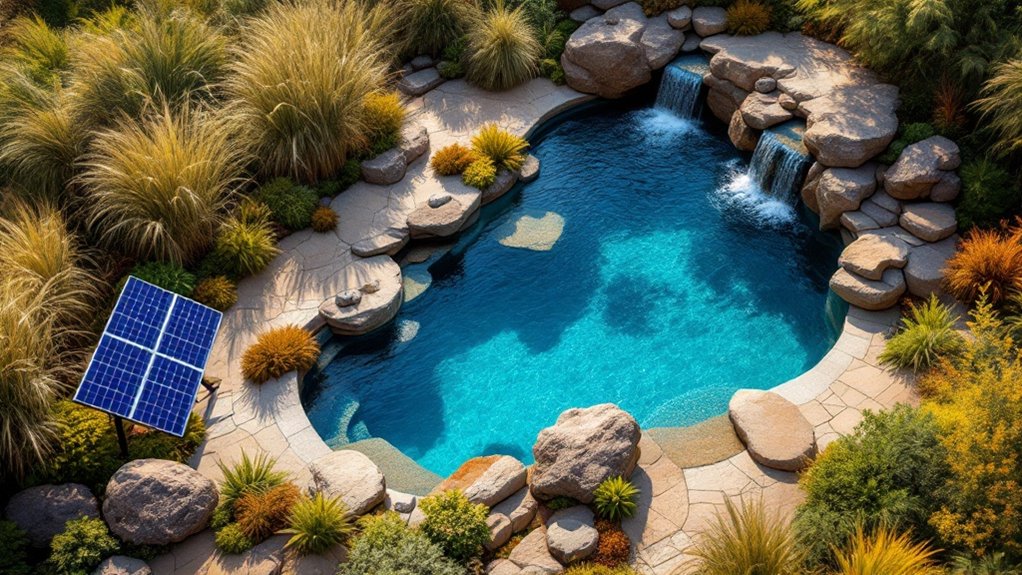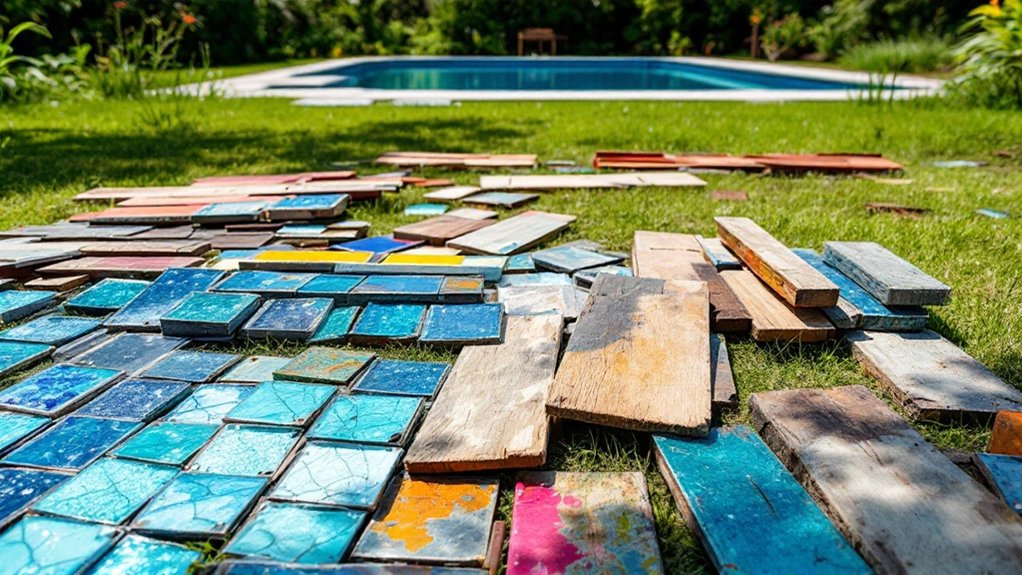The debate between biodegradable pool cleaning products and traditional chemical cleaners continues to gain traction among environmentally conscious consumers. Biodegradable options promise a safer alternative, utilizing natural ingredients that minimize harm to aquatic ecosystems. In contrast, traditional cleaners often raise concerns regarding pollution and health risks. Understanding the nuances of each choice can aid pool owners in making informed decisions about their cleaning practices. What implications might these choices have for both health and the environment?
Understanding Biodegradable Pool Cleaning Products
Although traditional pool cleaning products often contain harsh chemicals that can harm the environment, biodegradable pool cleaning products offer a more sustainable alternative. These products are formulated using natural ingredients that break down into non-toxic substances over time, minimizing their ecological footprint. Unlike conventional cleaners, biodegradable options harness plant-based enzymes and surfactants to effectively remove dirt, debris, and algae without introducing harmful pollutants into the water or surrounding ecosystem. They are designed to maintain pool hygiene while being safe for aquatic life and human health. Additionally, many biodegradable products come in eco-friendly packaging, further reducing environmental impact. As awareness of sustainability grows, more pool owners are choosing biodegradable cleaners to protect both their pools and the environment.
The Environmental Impact of Traditional Pool Cleaners
Traditional pool cleaners often contain harsh chemicals that pose significant risks of pollution to local waterways. This chemical runoff can harm aquatic life and disrupt ecosystems, leading to broader environmental consequences. Additionally, the potential for soil contamination raises concerns about the long-term effects on both land and water resources.
Chemical Pollution Risks
Many pool cleaning products contain harsh chemicals that pose significant risks to the environment. These chemicals, often composed of chlorine, phosphates, and synthetic surfactants, can leach into the soil and water systems, leading to contamination. When these substances enter waterways, they can disrupt local ecosystems, contributing to nutrient pollution and altering the chemical composition of natural bodies of water. Additionally, runoff from treated pools can carry these pollutants into nearby streams and lakes, further exacerbating the issue. The persistence of such chemicals in the environment raises concerns about long-term ecological impacts, including soil degradation and water quality deterioration. As awareness grows, the shift towards biodegradable alternatives seeks to mitigate these risks and promote more sustainable pool maintenance practices.
Aquatic Life Harm
While pool cleaning products are essential for maintaining water clarity and hygiene, their chemical components can pose severe threats to aquatic life. Many traditional cleaners contain harmful substances, such as chlorine and phosphates, which can leak into nearby water bodies. These chemicals disrupt aquatic ecosystems, leading to toxic conditions for fish and other marine organisms. For instance, chlorine can cause respiratory distress in fish, while phosphates contribute to harmful algae blooms that deplete oxygen levels, ultimately suffocating aquatic life. In addition, the persistent nature of these chemicals means they can accumulate in the environment, causing long-term damage to biodiversity. Consequently, the choice of pool cleaning products greatly affects not only the pool’s water quality but also the health of surrounding aquatic ecosystems.
Soil Contamination Effects
The environmental impact of pool cleaning products extends beyond aquatic ecosystems, greatly affecting soil quality and health. Traditional pool cleaners often contain harsh chemicals that can leach into the soil, leading to contamination. When these substances seep into the ground, they disrupt soil microbial communities essential for nutrient cycling and plant growth. The resulting soil degradation can hinder agricultural productivity and reduce biodiversity. Additionally, persistent pollutants may accumulate in the food chain, posing risks to wildlife and human health. In contrast, biodegradable alternatives minimize these risks by breaking down naturally and leaving no harmful residues. Shifting to environmentally friendly options can greatly mitigate soil contamination effects, promoting healthier ecosystems and sustainable practices in pool maintenance.
Effectiveness of Biodegradable Options
As consumers increasingly prioritize environmental sustainability, the effectiveness of biodegradable pool cleaning products has become a critical consideration. Research indicates that many biodegradable options utilize natural enzymes and plant-based surfactants, which can effectively break down organic materials and contaminants in pool water. These products often demonstrate comparable cleaning power to traditional chemical cleaners, making them a viable alternative. However, performance may vary depending on the specific formulation and the severity of the cleaning task. Factors such as water temperature and pH levels can also influence effectiveness. Overall, while biodegradable pool cleaning products may require slightly different application methods, they generally succeed in maintaining pool cleanliness without the environmental drawbacks associated with traditional chemical options.
Health Considerations for Families and Pets
Given the increasing awareness of health implications associated with chemical cleaners, families and pet owners often seek safer alternatives for maintaining pool hygiene. Traditional pool cleaning products frequently contain harsh chemicals that can pose risks to both human health and animal safety. Exposure to these substances can lead to skin irritations, respiratory issues, and other health concerns, particularly for children and pets who may spend more time around the pool area. Biodegradable pool cleaning products typically utilize natural ingredients that are less harmful, reducing the likelihood of adverse health effects. Additionally, they often break down more easily in the environment, minimizing chemical runoff. This shift towards eco-friendly options reflects a growing commitment to ensuring a safer, healthier environment for families and their beloved pets.
Cost Comparison: Biodegradable Vs Traditional
When comparing biodegradable pool cleaning products to traditional alternatives, initial purchase prices often differ considerably. While biodegradable options may carry a higher upfront cost, their long-term savings potential can be appealing due to reduced environmental impact and fewer health-related expenses. Analyzing both short-term and long-term financial implications is essential for consumers making informed choices.
Initial Purchase Prices
Many pool owners are increasingly considering the financial implications of their cleaning product choices, particularly the initial purchase prices of biodegradable versus traditional options. Biodegradable pool cleaning products often come at a premium due to their eco-friendly formulations and sustainable sourcing. This can lead to higher upfront costs compared to traditional chemicals, which are typically produced in larger quantities and at lower prices. However, the price variations can depend on brand reputation, product effectiveness, and local availability. While traditional options may seem more budget-friendly initially, the increasing demand for sustainable solutions has prompted some manufacturers to competitively price biodegradable products. Ultimately, initial purchase prices can greatly influence consumers’ decisions, as they weigh their commitment to environmental responsibility against budget constraints.
Long-term Savings Potential
Although biodegradable pool cleaning products may require a higher initial investment, their long-term savings potential can be significant when compared to traditional options. Many biodegradable products are formulated to be more efficient, often requiring smaller quantities for effective cleaning. This efficiency can reduce the frequency of purchases, leading to lower overall costs over time. Additionally, the environmentally friendly nature of these products can minimize potential liabilities and expenses associated with chemical spills or environmental damage. Moreover, as public awareness of sustainability increases, opting for biodegradable products may enhance a pool owner’s reputation, potentially attracting more clients for rental properties. Ultimately, while the upfront costs may be higher, the long-term financial and reputational benefits make biodegradable options a wise investment.
User Experience and Application Methods
How do users perceive the effectiveness of biodegradable pool cleaning products in their everyday applications? Many users report a positive experience, noting that these products often deliver satisfactory cleaning results without harsh chemicals. Application methods vary, with some opting for spray bottles for targeted cleaning, while others prefer concentrated formulas that require dilution. Users appreciate the ease of use and the non-toxic nature of these products, which aligns with environmentally conscious practices. However, some individuals express concerns about the time taken to achieve ideal results compared to traditional cleaners. Overall, while biodegradable options are generally well-received for their effectiveness and user-friendliness, experiences may differ based on specific products and individual preferences.
Long-term Effects on Pool Equipment
The long-term effects of biodegradable pool cleaning products on pool equipment warrant careful examination. Concerns regarding chemical corrosion risks and their impact on equipment longevity may influence maintenance practices. Understanding these factors is essential for ensuring the durability and efficiency of pool systems.
Chemical Corrosion Risks
Chemical corrosion poses considerable risks to pool equipment, often going unnoticed until substantial damage occurs. Traditional pool cleaning products frequently contain harsh chemicals that can accelerate this degradation process. Chlorine, for example, can lead to the oxidation of metal components, while acidic cleaners may erode surfaces over time. This corrosion not only compromises the integrity of pumps, filters, and heaters but also increases maintenance costs. Additionally, the buildup of corrosive substances can create an environment conducive to further deterioration. In contrast, biodegradable cleaning products generally contain milder, less corrosive ingredients, minimizing risks to equipment. Choosing safer alternatives can considerably reduce long-term damage, ensuring pool systems remain functional and efficient while extending the lifespan of essential components.
Equipment Longevity Considerations
While maintaining a pool, the longevity of equipment is often overlooked, yet it plays an essential role in ensuring a safe and enjoyable swimming environment. Biodegradable pool cleaning products can contribute positively to this longevity by minimizing the harsh chemicals that traditionally cause wear and tear on pumps, filters, and other components. Unlike conventional cleaners, which may contain corrosive substances, biodegradable options are formulated to be gentler on materials. This gentleness can reduce the frequency of replacements and repairs, ultimately translating to lower long-term costs. Additionally, the use of environmentally friendly products can foster a healthier ecosystem within the pool, potentially enhancing the lifespan of equipment. Therefore, selecting the right cleaning agents proves vital for sustaining pool functionality over time.
Maintenance Frequency Impacts
Regular maintenance frequency greatly impacts the longevity and efficiency of pool equipment. Frequent cleaning and monitoring can prevent the buildup of harmful substances that may corrode or damage components. In contrast, infrequent maintenance often leads to more severe issues, such as clogged filters and reduced pump performance. Biodegradable pool cleaning products, when used consistently, can minimize harmful residues and promote a healthier environment for equipment. Additionally, regular inspections can identify potential problems early, allowing for timely repairs and replacements. In the long run, maintaining a consistent schedule not only extends the life of pool equipment but also enhances its operational efficiency, ultimately resulting in cost savings and a more enjoyable swimming experience.
Availability and Variety of Products
A wide array of biodegradable pool cleaning products is now available on the market, catering to environmentally conscious consumers. These products include eco-friendly chlorine alternatives, natural algaecides, and non-toxic clarifiers, which provide effective cleaning without harming aquatic life or the surrounding environment. Many brands offer specialized formulations, targeting specific issues like algae growth, mineral buildup, or water clarity. Additionally, the increasing awareness of sustainability has led to an expansion in product lines, making it easier for pool owners to find solutions that align with their values. Retailers and online platforms now feature a diverse selection, allowing consumers to choose from various brands and formulations that suit their pool maintenance needs while prioritizing ecological responsibility.
Regulatory Standards and Certifications
The rise in popularity of biodegradable pool cleaning products has prompted the establishment of various regulatory standards and certifications to guarantee their safety and efficacy. Organizations such as the Environmental Protection Agency (EPA) and the American Society for Testing and Materials (ASTM) have developed guidelines that manufacturers must adhere to in order to label their products as biodegradable. These standards assess factors such as the rate of decomposition, environmental impact, and toxicity levels. Certifications like the NSF/ANSI 60 for drinking water additives also apply, ensuring that pool cleaning products do not adversely affect water quality. Consumers are encouraged to look for these certifications, as they provide assurance that the products meet established environmental and safety benchmarks.
Making the Switch: Tips for Pool Owners
How can pool owners effectively change to biodegradable cleaning products? First, they should research and identify eco-friendly alternatives compatible with their pool type. Reading product labels for certification and ingredients can help guarantee safety for both swimmers and the environment. Pool owners are encouraged to gradually replace traditional products, starting with the most frequently used cleaners. Additionally, consulting with professionals or attending workshops on sustainable pool maintenance can provide valuable insights. It is also beneficial to monitor the pool’s chemical balance during the change to prevent any adverse effects. Finally, joining community forums or groups focused on eco-friendly practices can offer support and further recommendations, making the switch smoother and more informed.
Frequently Asked Questions
Can Biodegradable Cleaners Damage My Pool Surface Over Time?
The question of potential damage to pool surfaces from cleaners requires careful consideration. Generally, most biodegradable cleaners are formulated to be safe, but inconsistent usage or specific formulations could lead to surface wear over time.
Do Biodegradable Products Require Different Application Techniques?
Different application techniques may be necessary for certain cleaning products. Users should follow manufacturer guidelines closely, as variations in pH levels and chemical compositions can influence how effectively the product cleans and interacts with surfaces.
Are There Any Specific Brands That Are Highly Recommended?
Several brands are highly recommended for their effectiveness and safety. Notable mentions include EcoClean, GreenPool, and Nature’s Best, each praised for their commitment to quality and environmentally friendly practices in the pool cleaning industry.
How Do Biodegradable Cleaners Handle Tough Stains?
The effectiveness of biodegradable cleaners on tough stains varies. Generally, they utilize natural ingredients that can effectively break down grime, though some users may find traditional options more powerful for particularly stubborn or deeply ingrained stains.
Can I Mix Biodegradable Products With Traditional Cleaners?
Mixing biodegradable products with traditional cleaners is generally discouraged. Chemical reactions may occur, leading to reduced effectiveness or harmful byproducts. It’s advisable to use each type separately for best performance and safety in cleaning applications.
Conclusion
Ultimately, biodegradable pool cleaning products present a compelling alternative to traditional cleaners, balancing effective cleaning power with a reduced environmental footprint. While they may initially seem more costly, their long-term benefits for both health and pool equipment make them a wise investment for eco-conscious consumers. As awareness of environmental issues grows, more pool owners are likely to evaluate the advantages of switching to these sustainable options, contributing to a healthier planet for future generations.




